Oscar Pistorius trial first week: Never mind a media scrum – murder case becomes bizarre safari following the tracks of a wounded lion
Five days into the ‘trial of the century’ and already it’s feeling a bit like Groundhog Day. Tom Peck in Pretoria reports on the farce and the fury inside the courthouse
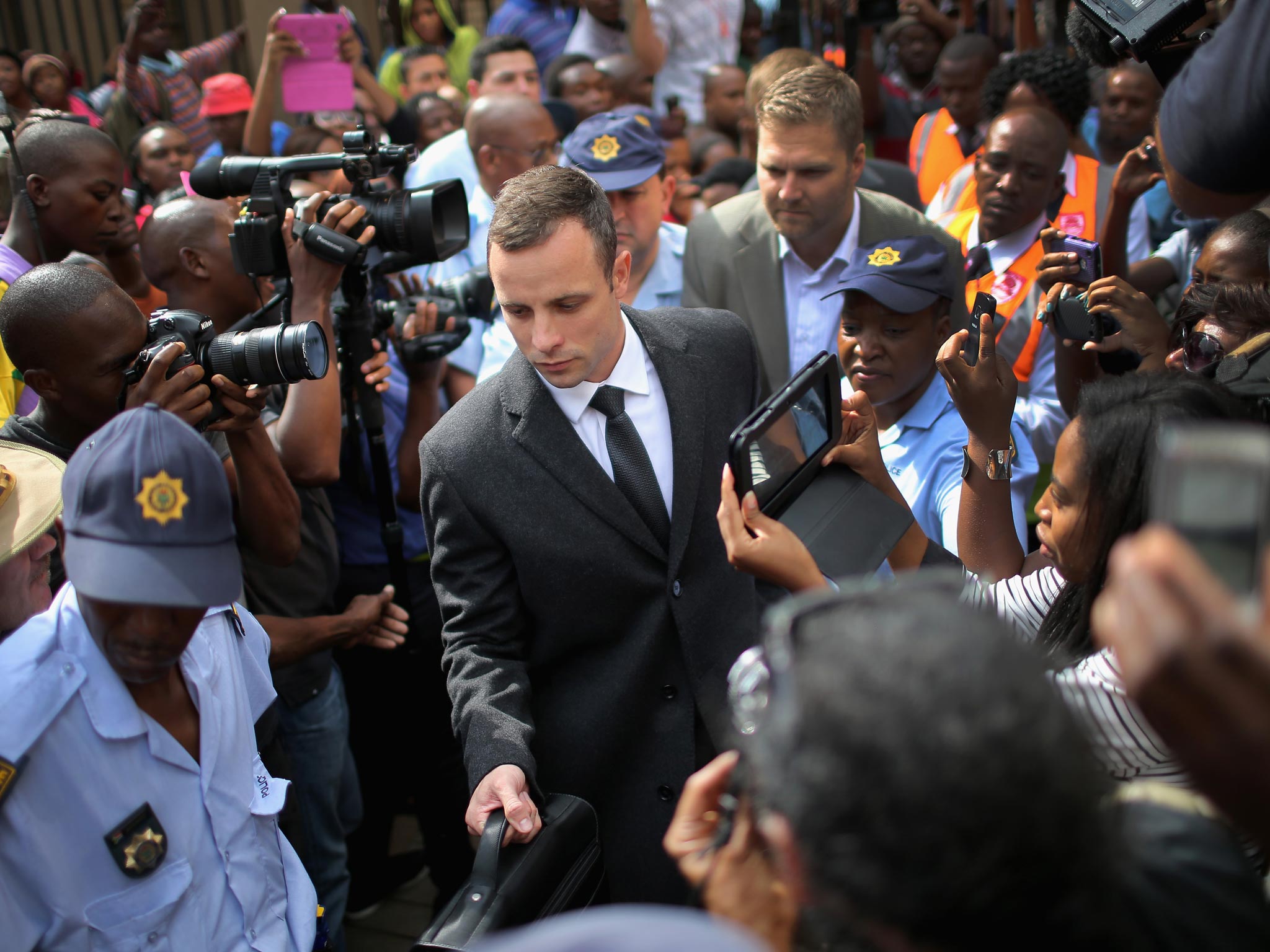
From the corner of Paul Kruger and Madiba Street the target is approaching, and the barked commands from behind the banks of lenses turn suddenly anxious: “Hold… Hold… HOLD... Wait... Wait… HOLD... Hold... Wait.”
The media in pack mode always gets called a scrum - rarely does it actually sound like one. But it’s day three of the "trial of the century" and the snappers and the cameramen lined up outside the North Gauteng High Court are begging each other to "hold the line". If they all manage to maintain their positions, Oscar Pistorius and his minders will walk calmly down the corridor of cameras they have established, turn in to the courthouse, and each will get the shot they need. A rugby ball popped between the front rows, and neatly hooked back. But it only takes one to collapse it, and then, like yesterday and the day before, it’s a free-for-all again.
That they somehow manage it brings loud whoops of delight, which Pistorius clearly hears as he passes through the metal detectors toward another grim day of grief and tears.
"Well done journalists!" one shouts. "We can be human beings after all."
The world’s press looks a little different now from when they last gathered here. Opposite the comparatively modest Pretoria court rooms stands South Africa’s grandly named Palace of Justice. Today, in the square outside, pigeons rest on the heads of statues of nineteenth century Boer citizen-soldiers cast in iron. In 1963, so large was the assembled crowd of angry men and women - for the most part black or coloured, but not all - that many had to hang from the limbs of the statues as they screamed their throats hoarse at the prison trucks that brought forth Nelson Mandela, Walter Sisulu and the rest of the ANC leaders, the defendants in the "Rivonia Trial".
The last words of Mandela’s three-hour speech that day are well remembered, that his struggle was one for which he was he “hoped to live” but was “prepared to die”. It is now commonly agreed that it was the continuing attention of the world’s press and the pressure this put on the apartheid regime that meant the men were sent merely to Robben Island, and not to the gallows. The ANC was banned. Its view could not be printed, but court proceedings were an exception.
It is facile to compare the two trials. This one is thrilling in its voyeurism, but it hardly matters. Yet the harsh glare of the world’s spotlight that is unrelentingly focused on it does to some extent illuminate the successes and failures of the struggle for which Mandela was prepared to give his life; to establish “a democratic and free society in which all persons live together in harmony and with equal opportunities".
There was no television in South Africa then. There certainly is now. There’s a brand new Oscar Pistorius channel, with a brand new studio set up entirely for the events of the next few weeks. The tents and broadcast trucks embossed with every imaginable acronym have been waiting outside for days before the trial began on Monday. CNN, ANN, PPN, BFMTV, ENCa, SABC, CNBC, even DFC - although that’s a fried chicken stand, there to feed them all.
Under the Africa News Network gazebo, it is impossible not to notice the flurry of black hands painting the white face and spraying the blonde hair of its glistening correspondent, as she sits in her chair while the adverts roll.
The chauffeured minivans that ferry the television people along their daily commute from court to the Sheraton (everyone is at the Sheraton), all pause at the traffic lights by the local bus station, where the rush hour queue in the rain for shared minibus taxis to work is perhaps a thousand people long.
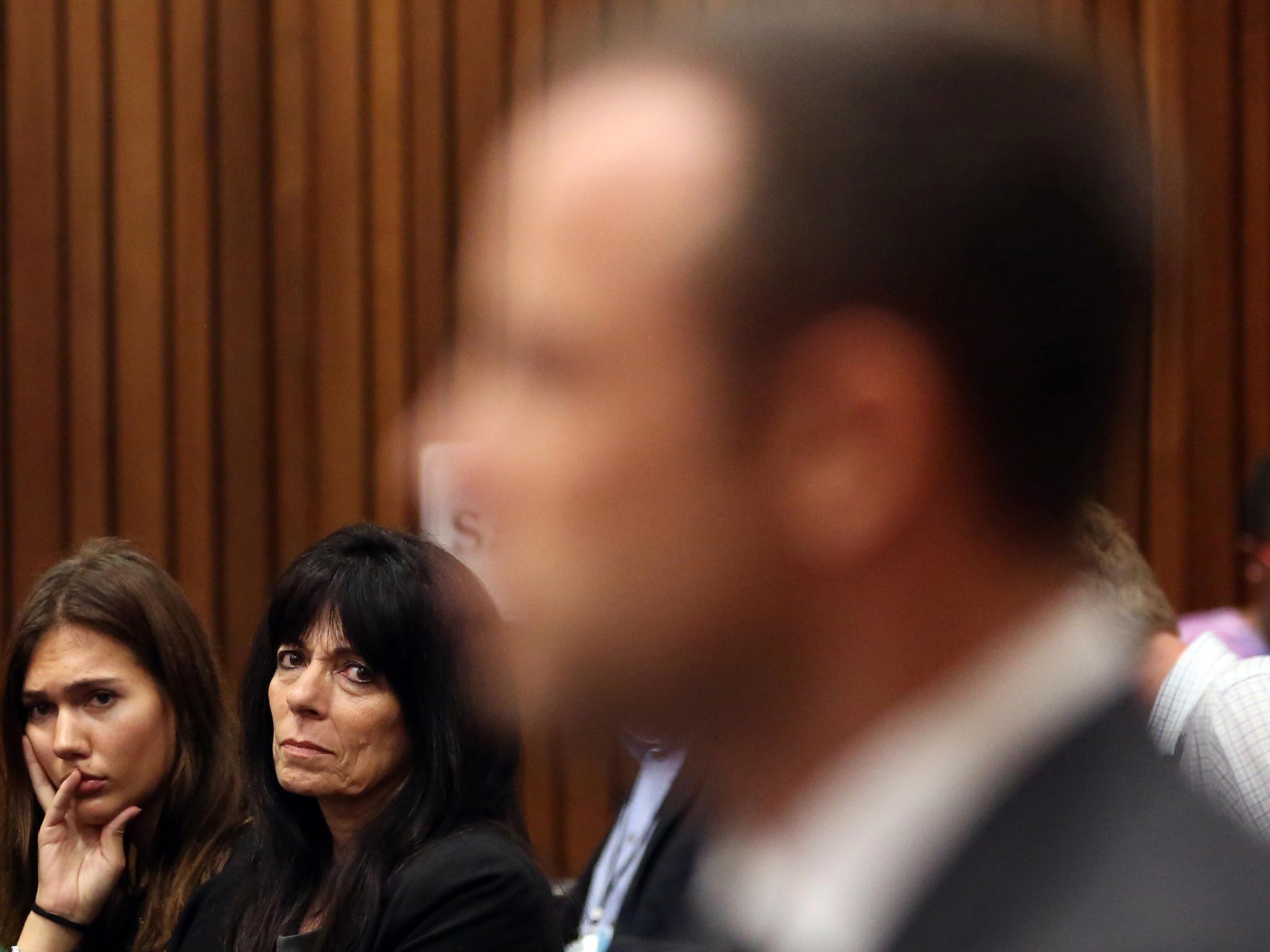
But the picture inside court could scarcely be more different.
Court D is a wooden box. Wooden benches, wooden seats, wooden walls, above a brown carpet and below a strip-lit panelled ceiling. Pistorius sits alone in a long dock that spans the width of the room. In front of him are three rows of lawyers in their customary court dress. Behind are two long benches for the families, five for the press and two for the public. Rising at the front are the judge and her two assessors. In a country where hierarchies are in constant flux, it’s worth noting the assessors have better chairs than her ladyship - thick rounded oblongs of scarlet leather, rising a foot high above their heads. The judge’s black swiveller is modest by comparison.
If it is a circus, there is no doubt who is the ringmaster. Judge Thokozile Masipa, the one-time crime reporter who only finished law school at the age of 43, doesn’t speak that often, but when she does, the gravitas weighs heavy in the air.
“The media must behave. They will not be treated with soft gloves,” she warned on the morning of the second day. And then yesterday, after a member of the public tried to have his picture taken with the accused: "This is not something I like to do with people who should know better. From now on if someone is seen to misbehave, you will forcefully be removed from this court."
Think of the South African accent and many people hear the sound of Barry Roux, Oscar Pistorius’s cocky Afrikaner defense counsel who we’ll come on to shortly. English, but spoken by the great-great-grandchildren of Dutch farmers, a strangled staccato warped by three centuries left out in the sun.
Yet the language of court is the mother tongue of just three per cent of this uniquely rainbow nation. Judge Masipa’s sound is one that most people outside South Africa associate with just one man, Madiba. Demographically speaking, it is the dominant voice here. That long, nasal lilt, the stresses and the pauses that seem to be in the wrong place.
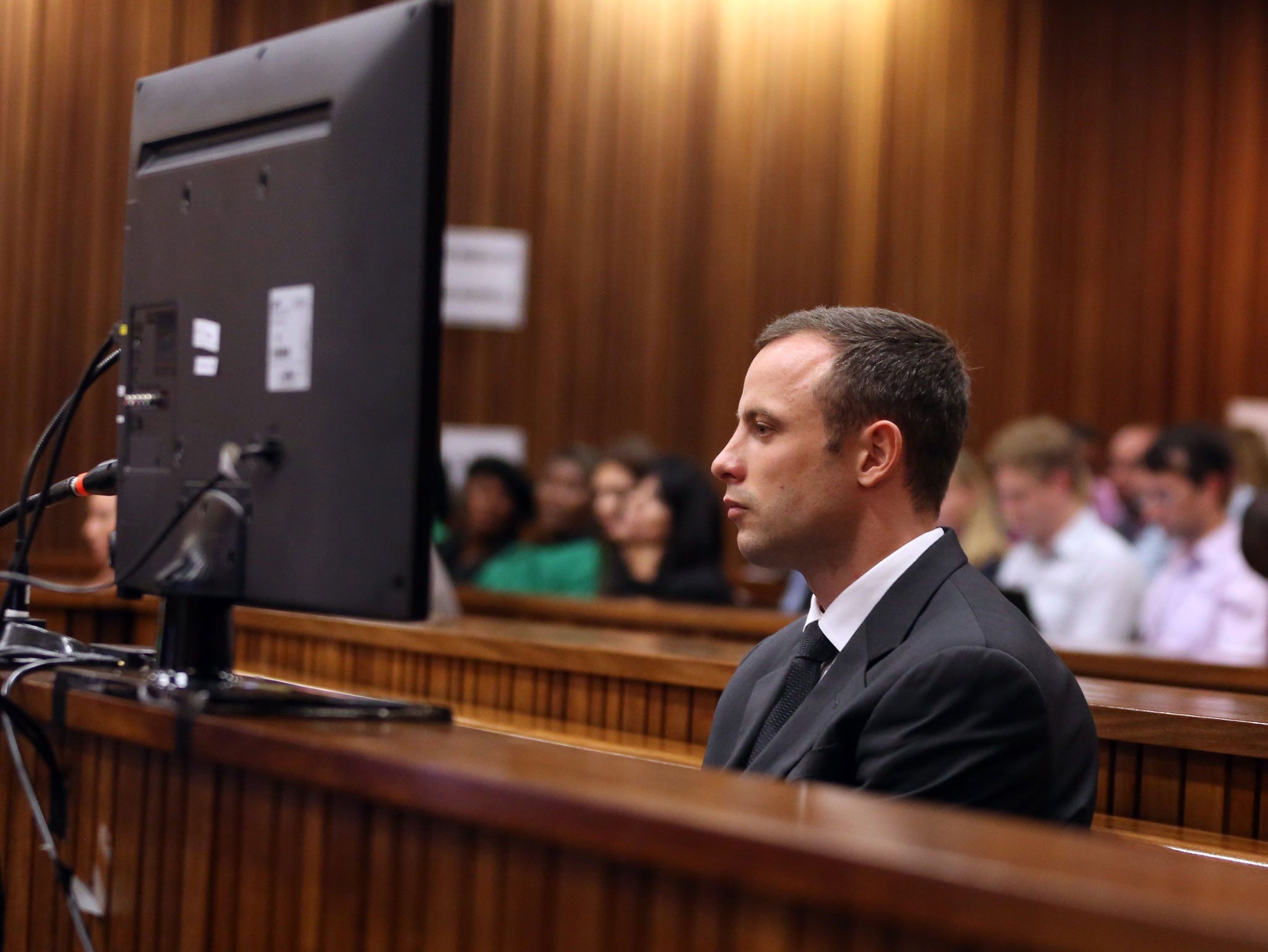
The two voices first met each other in earnest two hundred or so years ago, when Xhosa tribes expanding to the south west met Dutch colonialists moving east from Cape Town. They fought each other for a hundred years. At times it is hard not to look at the white men in their strange gowns stood at her feet, and not see a vision of squabbling Boers, taken prisoner on the eastern frontier, angrily blaming each other as they’re brought before the tribal chief to learn their fate.
You don’t need to have tuned in to the Oscar Channel for long to learn that the lead squabbler is Barry Roux. The head of Pistorius’s defence team described himself to an inquisitive journalist as “just a teddy bear”. He’s small enough to warrant the description, but you’d be brave to toss him into your baby’s cot.
A diminutive, grey-haired man with piercing eyes, his demeanour long ago crossed the tipping point from confidence to arrogance, never to return. At an English private school he’d have coxed the first boat. As a South African, his manner is more that of a rugby scrum half: wily, clever, skilful, and clearly getting his kicks from picking on the bigger boys.
When an Apartheid-era police chief hired him to sue newspapers over claims he supplied toxic gas for use against black liberation activists, the size of the damages were never made public, but one of the newspapers closed.
Almost the entire first three days of the trial were spent on his quest to discredit a married couple who claim to have been woken on the night of the shooting by the sound of gunshots and a woman’s screams. “I’ve asked you this question eight times, do I have to ask you it again?” he demanded at one point, peering over the top of spectacles which are every bit as crucial to his art as Eric Morecambe’s were to his.
When both parties resolutely refused to accept his increasingly angry suggestion that in fact the sounds were of a cricket bat hitting a door and Pistorius “screaming like a woman”, he became so sarcastic he was ordered to apologise by the judge, which he did so with a comic lack of sincerity: “I’m sorry My Lady, I really am.”
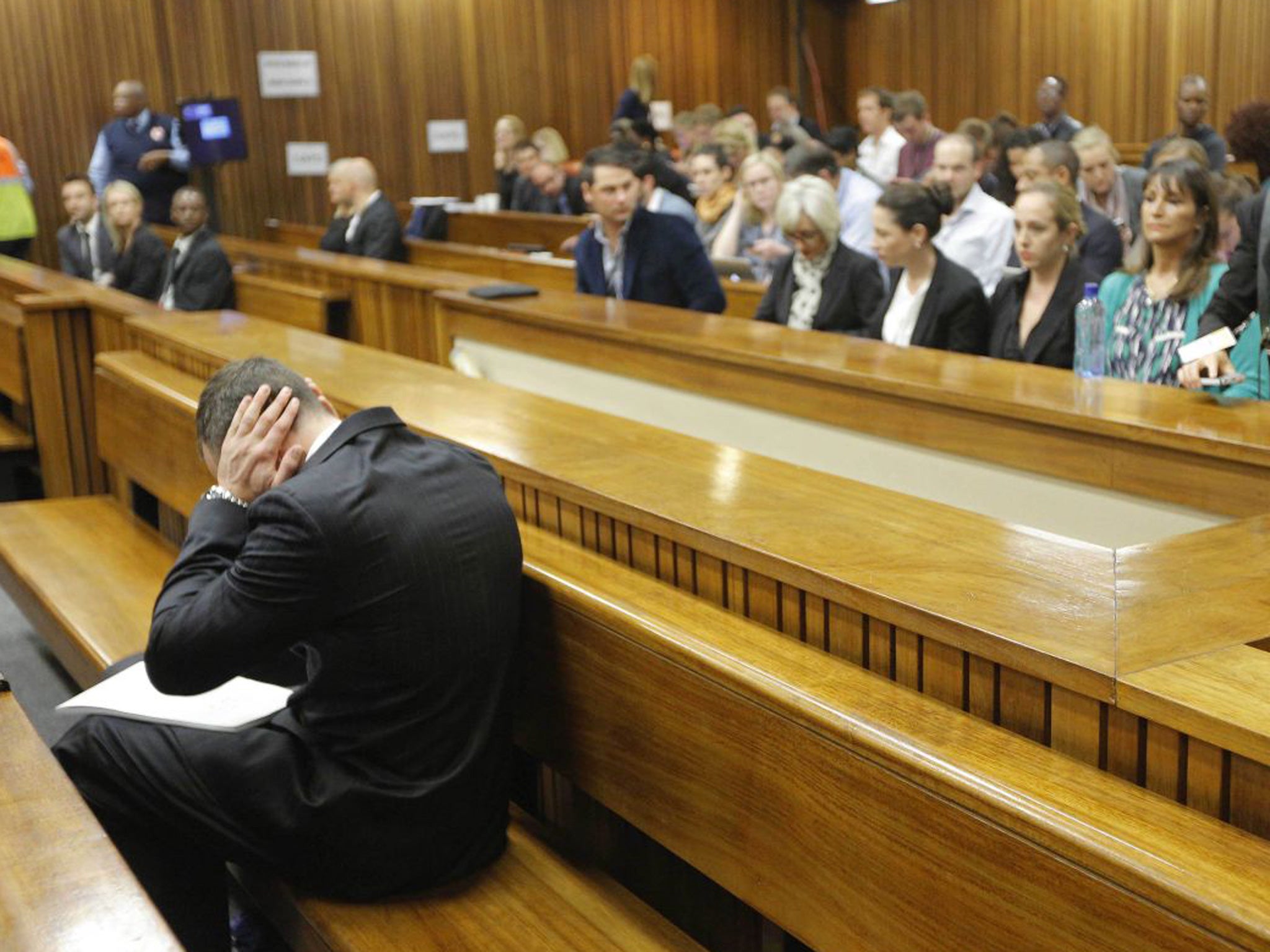
Pistorius’ team rarely speaks to the journalists that harass them as they walk in and out of court, but Mr Roux did tell one of the photographers who leaned in to snap him not to focus on "ugly men, but the beautiful ones,” which they since have been doing.
Shockingly, it took The Sun a full three days to write about the "Blade Stunner", Roxanne Adams, a fountain of creamy blonde hair and mascara’d eyes. A fine legal mind too, no doubt, but to the untrained eye her job here appears to be as official note passer, from Pistorius behind to Roux in front. She appears too young, you might think, to be working on such a landmark case, but the motivational messages that crowd her Twitter feed (to which no shortage of male journalists are suddenly subscribed) shed a little light on the secrets of her success. “Evaluate the People in Your Life; then Promote, Demote or Terminate,” reads one. Has her client’s fate taught her nothing?
In the other corner is Gerrie Nel, the smooth, avuncular state prosecutor, with his action man haircut and his firm, patient objections on the increasingly regular occasions that Roux goes too far. But all the witnesses to this point have been from his side and haven’t required cross examination, so his big moments are yet to come.
It’s hard for any spectacle to match the year-long drum roll to this case. Whisper it, but for long periods, it’s all been rather dull. So regularly are court rooms the stuff of movies, that the real thing almost never measures up. The Rocky films ruined real live boxing in much the same way.
By day three it’s all gone a bit Groundhog Day. The cricket bat. The door. The screams. The gunshots. At one point Roux demands of a witness: “Yes, but do you know what a cricket bat hitting a door sounds like? Are you an expert?”
Can an expert in such matters really exist?
But it’s easy enough to know when attention must be paid. In his now customary dark suit, white shirt and dark tie, sitting on a little yellow cushion, scribbling notes and passing them forward, the accused serves as a barometer for the drama.
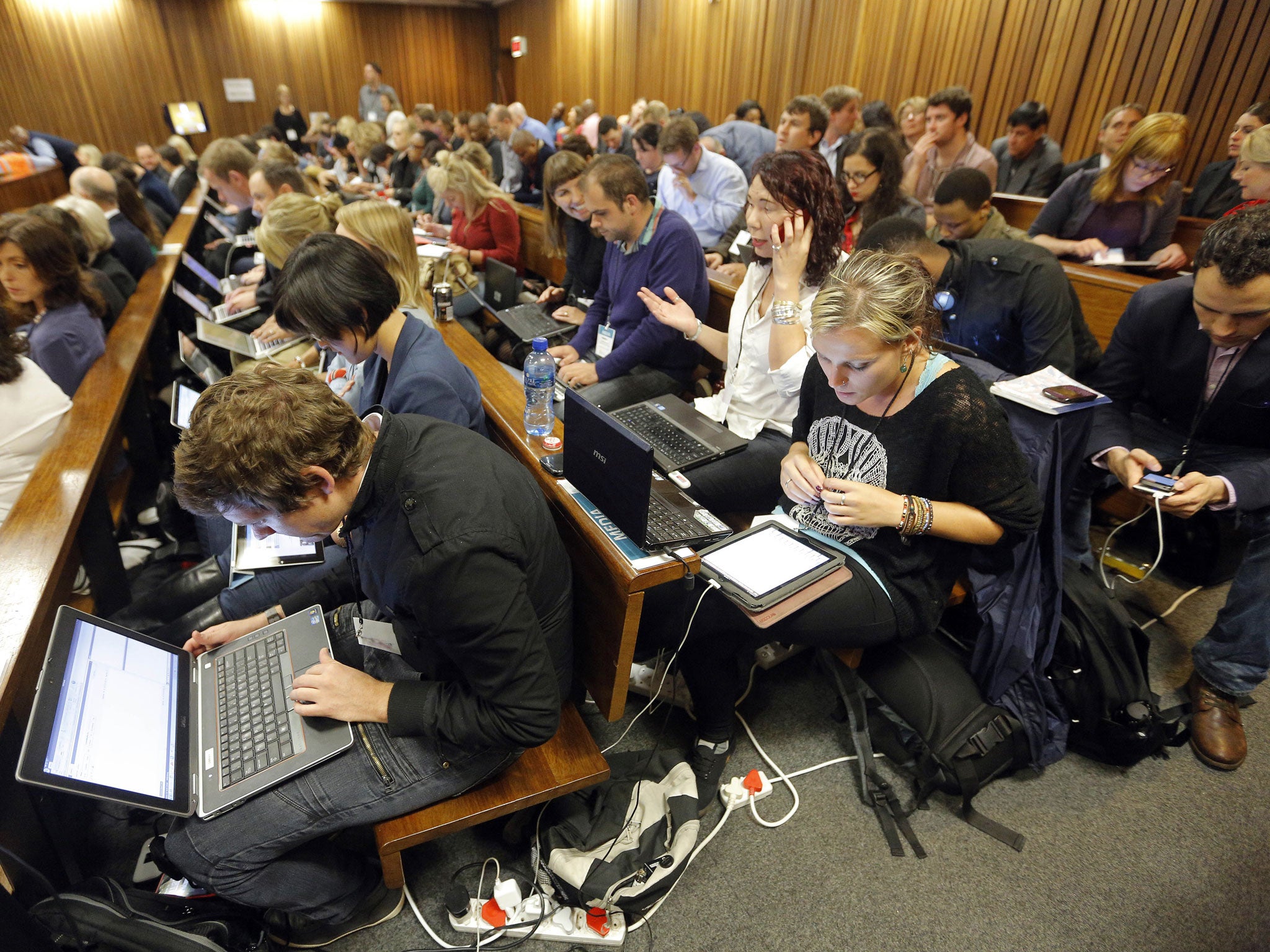
When gruesome court testimony suddenly forces him to face the reality of his deeds, the reaction is the same. The head goes forward, the hands go over the ears, occasionally the handkerchief comes out. Very occasionally so do a set of rosary beads. The grief is real, but it is a crass pantomime nonetheless.
The temptation is to stare at him, to look for signs of emotion or anger, or an unusual reaction to a piece of testimony. But every so often, as is human nature, his eyes catch the glare of yours, and you hurriedly look away.
At the end of each day, as all file out, the scrum forms again, this time inside by the court room door. The freshly polished TV people poke their microphones at him as he walks straight past, the long day done. For them, the real work is just beginning; looking gravely down the barrel of a camera, gesticulating, and talking of a day of drama and tears and emotion.
It being South Africa, there is an urge is to recast the scene, out on the rolling savannah, but the metaphors just aren’t there. The ecosystem is not in balance. Sure there’s jackals and vultures and hyenas and wise old apes, but there is no top predator. It’s a bizarre safari - just a wounded lion savaged by strutting peacocks. And it won’t be over for some time yet.